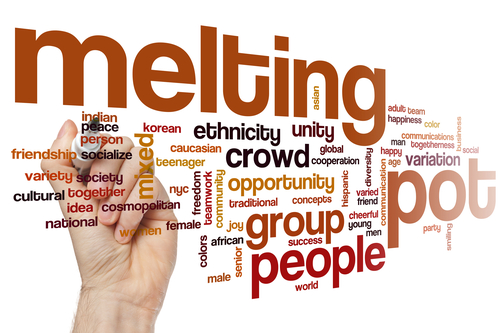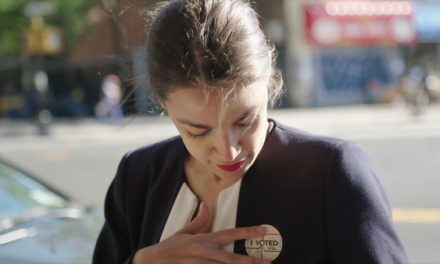
This is the common ground. Virtually all of us are aligned on this.
But this is not the commonly held belief in our country. The more prevalent thought is that, generally speaking, liberals think we should just let everyone in without process. Time and again, on conservative media and from the mouth of the President at his rallies, we hear that the left wants to let everyone in, especially the criminals.
One would think the absurdity of that would register with all people listening to it, but in fact it doesn’t. Quite the contrary. They keep repeating it and stoking fear. The narrative that immigrants are trying to “invade” to take away everything you hold dear becomes their truth. It’s got them by the throat and it breeds a paranoia that so many of their perceived ills could be solved if “illegals” weren’t taking their piece of the pie.
Liberals, of course, think this is only true of uneducated yahoos in red hats who are invariably cheering behind the President when he invokes all his red meat topics and names. But they’re wrong. A bunch of the educated, the savvy, the street smart, the people running things … they are invested in this ‘us vs. them’ mentality, too. It’s less about dumb vs. smart, more about if you see the world as a place that wants to screw you over vs. help you flourish.
There is a story I’ve heard told in my Italian-American family since I was a little girl. My father, who was born into a household where Italian was the only language spoken, was sent home from kindergarten and my grandmother was told to send him back when he spoke English.
When this story is repeated in my family, it is typically to support the argument that those coming here fleeing from other countries should adapt like we, Italian-Americans, did. Growing up, I always held that viewpoint as well.
However, as I got older and started tapping into my deep well of empathy and passion for nuance, I started having a different perspective on it. Can you imagine what that felt like for my grandmother, a very young woman named Nancy Colasurdo? A young woman doing her best to adapt to this country and now having an American institution up in her grill? I’m not saying it was a bad thing that my father learned English. But there is sure as heck a better way of handling it than being mean-spirited and cut and dry. These are human beings who wanted to thrive. This was their big sin.
Allow me to put on rose-colored glasses for a moment. Imagine a scenario where instead of demonizing Italian-Americans for coming to the United States to start a better life, those who were already here were welcoming. The Italian-Americans then, instead of becoming parochial and relishing their outsider status to the point of being suspect of “other,” quickly blend into the existing melting pot.
Maybe the fruits of this approach could be that my father grows up, has three kids, and teaches them Italian with pride so they can learn about their heritage. Once a boy is shamed for speaking his native tongue, it isn’t a natural progression for him to think this is worthy of passing on, is it?
I love being Italian-American and wouldn’t trade it, but let’s face it. My people on the whole want what was done to them to be done unto others. And guess what? That wasn’t pleasant. I wrote this after watching The Italian-Americans on PBS a few years ago:
The story unfolding on my television is too familiar. The people working in sugar cane fields. The lynching. The ‘hot-headed’ label. The emerging ‘dark and criminal’ image. The attitude of ‘let them kill each other in their neighborhoods.’ The denigration of their names as part of the ‘other’ label. The horrible work conditions. The looking down upon how they worshipped their God and relegating that worship to basements. The labeling of a whole swath of them as ‘enemy aliens’ during World War II. The detention in camps, imposition of curfews, threats of deportation. The wealthy media mogul with dangerous sway. The resistance to their presence in the land of white bread opportunity.
This is us now. We’ve become the lynchers, the ones calling the others hot heads and criminals, the ones looking the other way when working conditions are poor, the ones detaining in camps. Instead of remembering we were on the other side and never, ever wanting to inflict that on others, we’ve become that. It’s gross and demoralizing to many of us that we, via our government, are now in this inhumane role.
This is why, when I see these holier-than-thou statements on social media saying something like “I will not hate you because we disagree because I am so mature” it makes me want to scream. Disagree? This is not about disagreement, like butter pecan sucks and chocolate chip mint rules. Or even whether trickle-down economics works or doesn’t.
This is about being humane vs. being inhumane. So thanks for not hating your friends and family who disagree with you on separating families and keeping children in cages. I appreciate you not hating me because I think the President of the United States wanting the military to fire on refugees who (hypothetically) may throw stones is despicable.
Whether we’re talking about the Jewish-American story, the Irish-American story, the African-American story … all of them have components that are infuriating and to varying degrees we’re all products of those components. At what point might we unite in the common cause of figuring out how to humanely solve the problem of being the place everyone sees with such grand hope?
I don’t know the answer, but I know we’re not even close.




